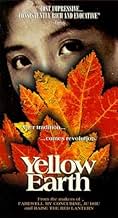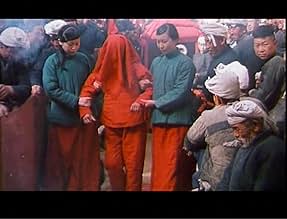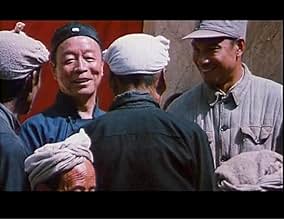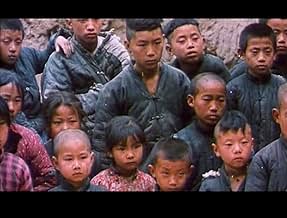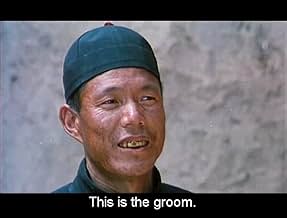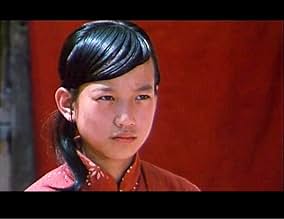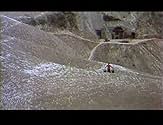IMDb-BEWERTUNG
7,1/10
2682
IHRE BEWERTUNG
Füge eine Handlung in deiner Sprache hinzuA communist soldier travels to Shanbei to collect folk songs for propaganda while visiting a poor peasant family, giving hope to the teenage daughter in escaping an arranged marriage.A communist soldier travels to Shanbei to collect folk songs for propaganda while visiting a poor peasant family, giving hope to the teenage daughter in escaping an arranged marriage.A communist soldier travels to Shanbei to collect folk songs for propaganda while visiting a poor peasant family, giving hope to the teenage daughter in escaping an arranged marriage.
- Auszeichnungen
- 8 Gewinne & 5 Nominierungen insgesamt
Empfohlene Bewertungen
Ugh, this is a hard movie to watch. It is both boring and depressing -- and yet really good! How crazy that it works out that way. Maybe because it's a little TOO close to the experience of real life. Here we have a film that's a window into the life of Cuiqiao, and her tiny family of peasants, in a north-western province of China during World War II.
The music is a motif and the main thematic element of the film, expressing the misery most eloquently. The plot sees a lowly Communist officer trying to catalog or find folk songs for the Communist foot-soldiers to sing as morale-boosters. The best singer in town is the shy and depressed Cuiqiao whose life is pitiable. I won't go into details, but it is depressing for reasons that are equally social and economic. The officer seems nice, but he seems like another pawn in a bigger power game -- a guy who really isn't so sure of his faith in the party beyond a means of escape. He's just another guy staying one step ahead of the virulent poverty the main characters suffer through.
Seriously, the stuff is really affecting and memorable. The funny scene or two in this movie is all the more smile-inducing because you're just so glad for the break in the bleak atmosphere. And the songs -- mein gott, what grating stuff to spoiled western ears, but simultaneously so gut-wrenching! I'd call this a period piece, but the experiences of rural western villagers in China are probably pretty timeless. I mean, the landscape is certainly changing, but there are a lot of places that are still like this.
Watch it, you spoiled punks!
The music is a motif and the main thematic element of the film, expressing the misery most eloquently. The plot sees a lowly Communist officer trying to catalog or find folk songs for the Communist foot-soldiers to sing as morale-boosters. The best singer in town is the shy and depressed Cuiqiao whose life is pitiable. I won't go into details, but it is depressing for reasons that are equally social and economic. The officer seems nice, but he seems like another pawn in a bigger power game -- a guy who really isn't so sure of his faith in the party beyond a means of escape. He's just another guy staying one step ahead of the virulent poverty the main characters suffer through.
Seriously, the stuff is really affecting and memorable. The funny scene or two in this movie is all the more smile-inducing because you're just so glad for the break in the bleak atmosphere. And the songs -- mein gott, what grating stuff to spoiled western ears, but simultaneously so gut-wrenching! I'd call this a period piece, but the experiences of rural western villagers in China are probably pretty timeless. I mean, the landscape is certainly changing, but there are a lot of places that are still like this.
Watch it, you spoiled punks!
10zzmale
including the communist ideology.
Great directorial work in describing the harsh conditions that not only resulted from unforgiving nature and political turmoil, but also from the burden of traditional Chinese culture, which is partly to blame for the political turmoils of post-revolution era. The film is one of the pioneers in the re examination of Chinese tradition and although it has not gone into detailed criticism like later films such as Bian Lian (Change Face) of later era, it was a good beginning.
Great directorial work in describing the harsh conditions that not only resulted from unforgiving nature and political turmoil, but also from the burden of traditional Chinese culture, which is partly to blame for the political turmoils of post-revolution era. The film is one of the pioneers in the re examination of Chinese tradition and although it has not gone into detailed criticism like later films such as Bian Lian (Change Face) of later era, it was a good beginning.
This film is Chen Kaige's masterpiece. Although he would eventually direct the more financially successful Devil on the Doorstep (another great Kaige film), this one packs more emotional wallop. The cinematography is very impressive, and led to the emergence of Zhang Yimou as China's greatest filmmaker of all time in the later 80s and all of the 90. A picture is worth a thousand words, and this film shows why. The story unfolds because of images, not because of dialogue.
The only other films of great note before this one, that showed the effects of poverty in China were Spring in a Small Village and San Mao (Three Hairs). Most other Chinese films were filled with excessive CCP dialogue extolling the virtues of socialism. It is much better to show it than to speak it.
Gu Quing plays the CCP soldier who works as a propagandist for village folk song research, and Ba Xue plays the young girl, who is sold into indentured slavery by ancient Chinese cultural traditions. The soldier affects both her and her younger brother. I will not reveal the outcome of these relationships, as it would spoil your enjoyment of the film. One of the best 150 Chinese films ever made, and probably in the top ten.
Gu Quing - The Soldier(as Xueyin Wang) Bai Xue - The Young Farmgirl.
The only other films of great note before this one, that showed the effects of poverty in China were Spring in a Small Village and San Mao (Three Hairs). Most other Chinese films were filled with excessive CCP dialogue extolling the virtues of socialism. It is much better to show it than to speak it.
Gu Quing plays the CCP soldier who works as a propagandist for village folk song research, and Ba Xue plays the young girl, who is sold into indentured slavery by ancient Chinese cultural traditions. The soldier affects both her and her younger brother. I will not reveal the outcome of these relationships, as it would spoil your enjoyment of the film. One of the best 150 Chinese films ever made, and probably in the top ten.
Gu Quing - The Soldier(as Xueyin Wang) Bai Xue - The Young Farmgirl.
Yellow Earth by Chen Kai-ge (Farewell My Concubine, Life on a String) was the first film of the so-called fifth generation of filmmakers who introduced a new aesthetic and social awareness to Chinese cinema. It is set just before World War II in Shaanxi province in Northern China near the Yellow River, an area referred to as gian shan wan he (thousands of hills and ten folds more gullies). Based on Ke Lai's novel, "Echo in the Deep Valley", the film shows the struggle of the peasants in the area known for its unyielding harshness and the folk traditions they drew on to express their anguish. As the film begins, cinematographer Zhang Yimou creates a feeling of desolation with panoramic shots of the vast landscape as a soldier from the Communist Eighth Route Army, Gu Qing (Wang Xueyin), walks over the barren hills to a small village. He says he is there to collect folk songs for the army to use so that "the people will know why they are suffering, why their women are beaten, and why they should rise up".
Comrade Gu stays with a poor family that includes 47-year old widowed father (Tan Tuo), his 13-year old daughter Cuiqiao (Xue Bai), and almost mute son Hanhan (Liu Quiang). Rather than relying on traditional narrative to convey the film's message, Kai ge uses long static shots and songs of the people to express mood and tone. The father has become embittered with his life of constant deprivation and sings "Life is hard for seasonal workers. They are hired in January, dismissed in October". Conditions are tough and the farmers pray for rain to alleviate the drought but there is no rain. At a wedding, the serving of wooden fish figures covered with sauce underscores the lack of adequate food. The film also dramatizes the sorry condition of women, showing how they had to carry heavy buckets of water on their backs for miles, and how they were forced into arranged marriages at a very young age.
Gu is seemingly confident of the fight he is waging. He lets the family know that in the South, there are no longer any arranged marriages and tells Cuiqiao about women who cut their hair, fight against the Japanese, and can read and write. She hears about her older sister's unhappy marriage and does not want to endure the same fate. "Of all us poor folk," she sings, "girls are the saddest." Cuiqiao is infatuated with Gu and wants to leave home and join the Army 200 miles away in Yanan. She knows that if she stays she will be forced to marry an older man in an arranged ceremony. When Gu leaves to return to camp, he promises to return in April. Promises alone, however, cannot change Cuiqiao's growing feeling of entrapment or the terrible consequences that follow. In its heartbreaking portrayal of people caught in lives of "quiet desperation" that even Communist ideas or marching songs cannot redeem, Yellow Earth speaks a universal language.
Comrade Gu stays with a poor family that includes 47-year old widowed father (Tan Tuo), his 13-year old daughter Cuiqiao (Xue Bai), and almost mute son Hanhan (Liu Quiang). Rather than relying on traditional narrative to convey the film's message, Kai ge uses long static shots and songs of the people to express mood and tone. The father has become embittered with his life of constant deprivation and sings "Life is hard for seasonal workers. They are hired in January, dismissed in October". Conditions are tough and the farmers pray for rain to alleviate the drought but there is no rain. At a wedding, the serving of wooden fish figures covered with sauce underscores the lack of adequate food. The film also dramatizes the sorry condition of women, showing how they had to carry heavy buckets of water on their backs for miles, and how they were forced into arranged marriages at a very young age.
Gu is seemingly confident of the fight he is waging. He lets the family know that in the South, there are no longer any arranged marriages and tells Cuiqiao about women who cut their hair, fight against the Japanese, and can read and write. She hears about her older sister's unhappy marriage and does not want to endure the same fate. "Of all us poor folk," she sings, "girls are the saddest." Cuiqiao is infatuated with Gu and wants to leave home and join the Army 200 miles away in Yanan. She knows that if she stays she will be forced to marry an older man in an arranged ceremony. When Gu leaves to return to camp, he promises to return in April. Promises alone, however, cannot change Cuiqiao's growing feeling of entrapment or the terrible consequences that follow. In its heartbreaking portrayal of people caught in lives of "quiet desperation" that even Communist ideas or marching songs cannot redeem, Yellow Earth speaks a universal language.
10mdworak
This movie is, to say the very least, a work of art. No other movie has ever evoked such emotional tears from my eyes as Yellow Earth. From the foreshadowing wedding ceremony, to the repetition in Cuigiao's own wedding, from distant silhouettes, to the ominous slow motion running of Hanhan during the ceremonial rain dance at the end, I have never felt the extent of sympathy for characters in a film as I have during and after viewing Yellow Earth. The folk songs reiterated the intensity of the sorrow through their text and solemn melodies. Ch'en Kaige beautifully crafted this film, bringing a little understanding of the plight of traditional China, and the revolutionary attempt to better their situation.
Wusstest du schon
- WissenswertesThe film was filmed near Yan'An, which is considered the motherland of the Chinese cultural revolution.
- VerbindungenFeatured in The Story of Film: An Odyssey: Fight the Power: Protest in Film (2011)
Top-Auswahl
Melde dich zum Bewerten an und greife auf die Watchlist für personalisierte Empfehlungen zu.
- How long is Yellow Earth?Powered by Alexa
- Why is this a "classic"?
Details
Zu dieser Seite beitragen
Bearbeitung vorschlagen oder fehlenden Inhalt hinzufügen


